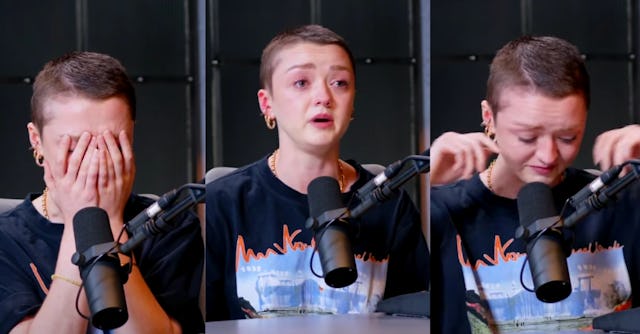Maisie Williams Recalls "Traumatic" Relationship With Her Dad
The 'Game of Thrones' alum sobbed while talking about her painful past on the “Diary Of A CEO” podcast.

Game of Thrones star Maisie Williams found success before she was even a teenager. The actress landed the infamous role of Arya Stark on the smash HBO hit when she was just eleven years old. That kind of pressure and stardom at such a young age could be a recipe of disaster, but Williams has shown the world that it only made her stronger.
While her acting career seems to be nothing but beneficial for the actress, her life before Game of Thrones did come with its own challenges — including an absentee father. In an interview on Steven Bartlett’s Diary Of A CEO podcast, the now 25-year-old talked about her life before she was Arya Stark and how traumatic her childhood proved to be.
She opened up (though sure to keep things vague enough to protect her siblings) about her dad, her resentment towards her mother, and growing up in a cult-like mindset.
“Well, I, as a young child before the age of, like, eight, had a traumatic relationship with my dad,” she explained. “And I don’t want to go into it too much because it affects my siblings and my whole family.”
Williams continued, “But, like, that really consumed a lot of my childhood. Ever since I can remember, I’ve really struggled sleeping. And I think a lot of the traumatic things that were happening, I didn’t realize that they were wrong.”
Maisie said her mother left her father when she was just four months old.
She then went on to tell a heartbreaking story about teachers at her school expressing concern over her home life when she was just eight years old. Her issues with her father “had met its peak”, and a teacher at her school took her aside and asked her what was going on.
“...she was saying, like, ‘What’s wrong?’ you know, like, ‘What’s happened? Are you hungry?’ ... ‘Did you eat breakfast?’ I said, ‘No.’ And she said, ‘Oh, why no?’ And I said, ‘We just don’t have any breakfast.’ And then she says, you know, ‘Do you normally have breakfast?’” she recalled.
Williams began to sob, “They were asking the right questions. My mum came to school and picked me up. It was the first time that all of the doors were open and all of these things that we were experiencing were out on the table.”
But even realizing that she deserved, at the very least, food on the table every morning, Williams recalls still feeling some sort of devotion to her dad and couldn't understand why she was being separated from him.
“I still wanted to fight and say these things aren't wrong, you're just trying to take me away from my dad and that’s wrong,” she said. “I was indoctrinated in a way. I think that’s why I’m obsessed with cults. Because I’m, like, I get it, I get it. I was in a child cult. I was really fighting it at the beginning, my whole world flipped on its head.”
She went on to explain how complicated and mixed her feelings towards her parents were even after truly realizing that being separated from her dad was the best thing for her.
She added, “I was so glad I didn’t have to see my dad anymore, but it was against everything I’d ever known. You can feel so liberated and free and at the same time, just like that impending doom is kind of still there. All your problems don’t just go away, you still care a lot about that person, or the pain that led to those very, very poor decisions.”
Williams also opened up to Bartlett about how her childhood trauma has affected her mental health in adulthood. She battled identity, anxiety and mental health issues.
“To be honest, I have been thinking about this a lot. It’s not because of me that these bad things happened when I was a child,” she told the host. “I thought it was. I thought there was something inherently wrong with me, that it could be anyone experiencing the pain.”
Truly processing through her childhood issues made her curious about her dad, questioning why he behaved the way he did and who might have hurt him when he was younger. As most know, generational trauma is a thing.
“It made me more interested in the guy. What could make you mistreat your own children? What happened to you as a kid? Did you pull the legs off bugs? Did you learn all this?”
Watch the full interview with Maisie Williams here.